- Home
- Fay Weldon
Down Among the Women Page 5
Down Among the Women Read online
Page 5
(Susan is having her baby privately, at home, and the doctor, Mr Joseph Justice, is a rich and go-ahead man.)
Now there are messages for help left all over London but still Scarlet lies on Susan’s couch and prepares to give birth. Susan is mismanaging the whole situation disgracefully.
And what will Kim say?
Susan goes to the bookshelves and takes down a book on progressive childbirth. It once belonged to Wanda. It was written in the 1920s and the photographs disturb her. The women look like her mother—the same swoop of hair over the forehead, the same small smile, the same hairless, marble limbs. She has wondered why Kim keeps it, wondered the more at herself for not throwing it away. For Susan does not believe in the written word, she believes in her Mr Joseph Justice. But alas, Mr Joseph Justice has gone fishing or whatever, leaving on an answering machine in his place. She turns to the section marked ‘Deliveries au naturel’ and returns to Scarlet.
‘Get the police,’ says Scarlet.
‘The expectant mother often panics,’ reads Susan aloud, ‘and believes the birth more imminent than in fact it is.’
‘Get the neighbours,’ says Scarlet.
‘Have the waters burst?’ enquires Susan.
‘What waters?’ asks Scarlet.
‘The womb is filled with a clear water-like liquid,’ says Susan. ‘Before you can have the baby it all comes out. Has it?’
‘I don’t know,’ mutters Scarlet. ‘I’ve no idea. I went to the toilet and everything seemed very wet but I don’t know. My mother still wets her knickers, perhaps I just take after her.’
Susan winces.
‘It doesn’t sound like the waters,’ says Susan.
‘By the waters of Babylon,’ moans Scarlet, ‘we sat down and wept.’
Susan concludes she is wandering in her mind.
‘Do you have a show?’ she enquires, reading on.
‘What’s that?’ asks Scarlet, who has read nothing about childbirth, believing herself to be so natural, normal, and healthy that the details can hardly concern her. Details are for neurotic and frightened women. It does occur to her now, with a shock that quite stops her feeling pain, that she may be both neurotic and frightened herself. Neurotic to be lying here upon her stepmother’s couch; frightened, not just because it hurts and she has no idea what’s happening to her, but because she has remembered that women do die in childbirth, and that the magic which protects her from disaster has lately shown signs of weakening. It seems quite likely to Scarlet now that Susan will let her die, either from stupidity or from malice.
‘It says here a show,’ says Susan forlornly, ‘but it doesn’t say what a show is.’
‘You are a fool,’ says Scarlet, and Susan feels indignation, until, reading on, she discovers that women in childbirth often show signs of irritation.
The pain in Scarlet’s back evaporates. She feels better, gets up, walks about, announces it was a false alarm.
‘Shall we get a taxi to a hospital?’ asks Susan tentatively.
‘No,’ says Scarlet. ‘I’ve never taken a taxi in all my life. I don’t approve of them. I’m perfectly well and healthy.’
‘Perhaps you’d better get home while you can,’ says Susan, with dismal cunning. She, who once felt so possessive of Scarlet, so charitable, so condescending, can now hardly wait to get her out of her territory.
‘Home?’ enquires Scarlet. ‘What home?’ and watches with pleasure the blood surging into Susan’s face. Perhaps Susan is going to cry.
‘When you think of it,’ says Scarlet, ‘this is as much my home as anywhere else. My father’s place.’
‘You are not a child,’ says Susan, made quite sharp by desperation. ‘You ought to have a home of your own by now.’
Scarlet is dejected and deflated by the truth of this observation. She feels very strange in her body, and wants to go to the lavatory.
‘I’ll just go to the loo,’ she says. ‘Then I’ll get the bus home.’
‘Perhaps you should,’ says Susan.
‘You just want me to have it in the street, don’t you?’ complains Scarlet, going into the bathroom, where Susan’s baby’s pretty bath and Susan’s baby’s fragrant toiletries wait for the arrival of their user. Susan waits for retribution. It comes. Scarlet opens the door briefly and remarks, ‘My baby’s going to be bathed in the sink, along with the saucepans. We can’t afford this kind of thing.’
Susan runs headlong into her dark kauri forest but it has shrunk: she is only there five seconds before she is out the other side and into brilliant sunshine again. It is Scarlet’s fault.
Susan is angry.
If Scarlet could only have been humble and grateful, had only asked favours, how happy Susan could have been, sharing baby vests, lending nappies, offering advice, arranging an adoption perhaps—even adopting herself, taking in instead of pushing away her husband’s past—and all out of the public kindness of her heart. But Scarlet won’t accept favours. Scarlet has come claiming her rights, and now Susan feels threatened, and frightened, and unprotected. Susan cries out in her heart against Kim for not being there when she needs him. Yet she dreads his return. She had wished to surprise him with her own generosity and understanding; she sees now that what she will surprise him with is a terrible, hideous encumbrance.
How neat and pretty her drawing-room (she was slapped on the boat coming over for calling such a room a lounge) seems without the voluminous presence of Scarlet. But why is she so long in the bathroom? Why must she be so extreme in everything she does?
Susan has a small and tidy pregnancy under a pretty spotted smock. You would never have known Susan was pregnant until well into the fifth month. Simeon curls tightly, tightly, never giving way, seldom flailing, only occasionally aiming an irritable blow against the pulpy walls of his confinement.
Susan nearly telephones her mother, but knows her mother will have ’flu or people round. There is a ’flu epidemic. Susan’s mother is a sucker for minor ailments, thus preserving herself against the sudden major killers. Perhaps she’ll live for ever, this bourgeois monster? Susan’s mother would leave Susan in prams outside shops, sometimes for hours, going home by herself and forgetting she’d come out with pram and baby. On the day Susan got married Susan’s mother murmured a languid prophecy about the consequences of marrying an older man, but forgot to do so until after the ceremony. She cared that her children should reflect credit on her: she did not care for her children. She did not care for her husband; she did not care for life itself. She played bridge and caught ’flu, and waited for life to pass her by in as comfortable and orderly a way as possible. So Susan now realizes, sitting and waiting for the heaving Scarlet to emerge, wondering why she cannot after all be like other people as she had so hoped to be.
Poor Susan.
Lucky Susan.
In Susan’s bedroom, next to the bed she shares with Scarlet’s father—Susan, brought up in a world of twin beds, is still nightly disconcerted by the feel of another body next to hers—the white frilly crib waits for its occupant. There on the chest of drawers, above Scarlet’s father’s shirts and ties and underpants, above Susan’s knickers and bras and scarves, are stacked the piles of Harrington’s nappies—thirty-six towelling, thirty-six gauze—the six long Viyella gowns—size 0—(no stretch zipper suits, this side of man-made fibres) the six Cherub woollen vests, the four bootees, the two bonnets, the rubber undersheet—(no plastic then)—the two shawls, the three coatees, the little jar of Vaseline, the baby brush, the rattle. They wait, in confident expectation of a healthy, well-formed, live baby.
And there on the table stand all the items required for a home confinement, as specified by Mr Joseph Justice, who with the assistance of Miss Taylor the lady midwife, means to deliver poor Susan, lucky Susan, of her planned and lawful baby. (Kim will wait in the room outside; he will not be asked in. It is not yet the custom.)
Scarlet is going to have her accidental baby in hospital, and take it home to the green and yellow lino. There are no ante
-natal classes. She has no idea what is happening inside her, or why she now sits aching on the lavatory bowl. Her baby’s crib will be the bottom drawer of the kitchen dresser, padded with crumpled newspaper and covered with white rexine. This crib has been Wanda’s present to the expected baby, together with these words to Scarlet, ‘Don’t fuss.’
Scarlet is competing with Wanda in non-fuss, in which Wanda is an expert. Scarlet in any case has a blank where a future ought to be. The birth of her baby is a wall she hesitates to look over. She does not believe that because she is having a baby, she is going to go on having a baby. That it will presently get up and walk away and look back and jeer, having turned into another person, has not occurred to her. That it may live to carry tales of a newspaper-padded Rexine-lined dresser bottom drawer to others does not now concern her.
Scarlet comes out of the bathroom.
‘Why were you so long?’ asks Susan.
‘I don’t know,’ complains Scarlet. ‘I want to go but I can’t.’
Susan had not wanted so precise an answer.
‘I’ll be off now,’ says Scarlet brightly.
‘Are you sure you’ll be all right?’ asks Susan, who simply wants her out of here, quick, before Kim returns.
‘Yes,’ says Scarlet, who isn’t.
‘I’m sorry you missed Kim,’ says Susan. ‘Give him a ring and come round some time when you’re feeling better.’
‘Well,’ says Scarlet. ‘Tell him I came. Tell Daddy I was here.’ It is the best she can do by way of attack.
‘I will,’ says Susan, and practically pushes Scarlet out of the door. She shuts it and puts up the chain. She goes and lies down on the bed. She closes her eyes. She wishes she was single again. She wishes she was not pregnant. She wishes she could go and drink some coffee without being sick. She wishes there was someone, anyone in the whole world she could trust. She does not want Kim to come home. He is too real for her now; his past has been going on too long: he has accrued too much strength from it. She sees him as a walking jigsaw, and every piece has been left by some other person, some other event, of which she knows nothing. And this monstrous jagged stranger, her husband, lies nightly like an incubus in the dark beside her, inserts his being into her, and grows his child within her.
Susan runs off into her forest, padding quietly over the moss. She comes into a sunny clearing, too sunny, too bright. Fallen trunks powder and flake. There is a magpie there, black and crow-like. ‘Wardle ardle oode,’ it gloats, gaping its angry pecking beak, in its tonsilly, warbly voice. ‘Go on out,’ it shrieks. Magpies in New Zealand learn to talk. Susan’s mother had a pet one: kept it chained by its leg as a watchdog (it would frighten the cats and dogs away); trained it to say a few simple words. ‘Go on out.’ Susan evades the magpie and runs on. It is, after all, chained; it cannot pursue her. She is running hand in hand with Kim. He is all of a piece again; not jigsawed.
She sleeps, relieved.
Scarlet has got half-way down the stairs. She goes no further. She crouches on the stairs and groans. Here, returning, Kim finds her. He thinks she is a stranger, and is kind. He is a kind man.
Helping her up the stairs, he is not conscious that this flesh is of his flesh. Why should he be?
Kim is the envy of his pot-bellied friends. They are conscious of mortality; not he. He has pushed back the barriers of decline by twenty years or so. He has a young wife; he is starting again. Kim is slim, casual and happy.
Kim has known trouble in his time. He has known Wanda, and escaped. He has grieved for the loss of his daughter, and recovered. He has known fame, success, and wealth, and what it is to lose these blessings. He has been whirled to the centre of the world’s affairs, and been for a time at its still, magic fulcrum: then flung out again, cold and penniless, to the crowded anonymity of the perimeter.
He has lost many things in his life, including six good years to the war and the Education Corps, where he laid land girls (What, your honour? A sheep? I thought it was a land girl in a duffle coat.) and taught illiterates. He has found many things too. He has found Susan’s father, fresh from the Ministry of Food’s propaganda section (the nation now cooks better, eats better, than ever before—children in the north are two inches taller in 1946 than they were ten years before).
He has found Susan. Scarlet’s father starts an advertising agency with Susan’s father. Scarlet’s father marries Susan, renews his life. If he saps her strength she surely has enough to spare. She is docile, sweet, pretty and admiring. Susan loves. Susan is young. Susan’s father is rich. Scarlet’s father loves Susan.
Where has Scarlet’s father been this afternoon, thus allowing his wife to be so cruelly exposed to his daughter? He has been building the future, all our futures, talking to a new client, who works in a shed in the hills behind High Wycombe trying to dry and pulverize coffee beans on a commercially viable scale. There seems a future in it; Kim must be pleasant to the client, who likes to drink in the afternoon, but has nowhere in High Wycombe to do so, except at home where his wife is teetotal.
Kim takes his client round the drinking clubs of Soho and fixes him up for the evening with an available girl Kim knows. The client, he suspects, would rather go home to his wife but can hardly look a gift lay in the teeth. Besides, is he not growing rich? Are such things not his perks? Kim telephones the client’s wife and says her husband is having dinner with him, and then retreats back to the safety of his own home as quickly as he can.
Kim keeps his painting past, his canvases, in racks in the attic. One day, when the Tate brings his two bought paintings up from their basement and hangs them where they can be seen, he means to sell the rest and grow rich, and thus encouraged, paint again. In the meantime he will put his faith in coffee beans.
When he first sees Scarlet on the stairs he thinks for a terrible moment it is Susan. He feels bad about lying to the client’s wife, and expects retribution. Seeing it is not Susan, but someone far more mountainous, he is relieved. The groans of this stranger, he feels, are, though disturbing, at least not his fault.
They have gone but two steps upwards—she is very heavy and seems to have little instinct for self-help—when they are overtaken by Mr Joseph Justice, who has received a garbled message from his recording machine. The tape was set at the wrong speed and the words cannot be deciphered but he has recognized the timbre of his patient’s voice and come at once.
Together they make better speed. They find the door on the chain and Kim rattles, shakes and shouts to wake Susan, who staggers sleepily to open it.
A three-part monster enters her home. She can make little sense of it at first. One speaks, crossly. It is her husband’s voice.
‘Why in God’s name was it on the chain?’
She sees, now. Her doctor, her husband, her stepdaughter, united in monstrosity.
‘Shall I ring for an ambulance?’ her husband is asking.
‘Too late for that,’ her doctor replies. ‘Get her in to the bed.’
Susan tries to stop them; she tugs and drags at the lumbering heap.
‘You can’t,’ she cries, ‘you can’t!’
Her husband, horrified, shakes her off.
‘You don’t understand,’ moans Susan, ‘it’s your daughter. It’s Scarlet.’
Kim, though shaken, is deflected only for a moment. As for Mr Joseph Justice, he’s delighted. He thrives on the bizarre.
Susan sits and cries in her chair while her stepdaughter’s child is delivered in the bed prepared for her child. It is Susan’s doctor who smiles his expensive smile at the wrong mother and means it, for Scarlet is too terrified even to moan and so get mistaken for a brave good mother.
And who will pay the bill? Why, Susan’s husband. He paces the room, consumed with rage, at Susan, at the world, at everyone.
Bitterness against Wanda, which he thought was dead, has been foxing him, lying dormant. Now once again it is seeking out the old pathways. Kim finds himself anxious: but then Wanda was always good at making him
anxious: there is a pain in his chest: when he was with Wanda he was always in pain. And Wanda would infect him with the expectation of disaster—moral, financial, emotional, political and practical—and thus make him aware that he had always feared, somehow invited, calamity. Now she has sent this emissary, this daughter, yet surely no part of him, here to torment him and complicate his future.
He cannot find words to talk to Susan. She is too young. She cannot, will not understand. Look at her now, pouting and grizzling, incapable of any serious emotion.
In the bedroom Mr Joseph Justice holds Byzantia up by the heels and slaps her on the bottom. There is no need for it, since she is breathing perfectly well, but the gesture seems to reassure his patient. Besides, it is traditional. ‘Take that,’ says the doctor, in effect. ‘And that! See if you enjoy it either!’
Byzantia cries.
‘It’s a girl,’ he says to Scarlet.
‘You’re lying,’ she says.
‘A granddaughter for you, Mr Belcher,’ sings out Mr Justice through the open door, hoping for a more reasonable response.
But there is silence. Susan stares at her old, old husband; and he stares into his soul and sees that it is no longer young.
‘Say something,’ whines Susan presently.
‘Splendid, splendid,’ he calls back to Mr Justice, which was not what she had hoped for.
‘I could do with some help,’ says Mr Justice, ‘what’s the matter with you both?’
‘Go on,’ says Kim, ‘you’re a woman.’
‘You go,’ says Susan. ‘It’s your daughter. It’s nothing to do with me.’ It is the first time she has defied him.
‘I’m sorry about it,’ he manages to say, ‘but you knew when we married that Scarlet existed. I hid nothing. I wasn’t to know she’d turn up.’
But he can’t say anything right.
‘You can’t just shift the responsibility now,’ says Susan. ‘Go on in there.’
‘I’m a man,’ he says. ‘It’s no place for a man. Did she say who the father was?’
‘No.’
‘Didn’t you ask?’ His voice makes clear what a fool he thinks her.

 Trouble
Trouble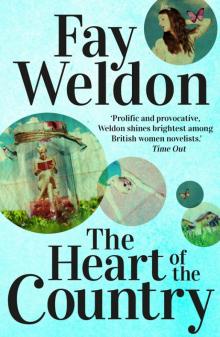 The Heart of the Country
The Heart of the Country Wicked Women
Wicked Women Mischief
Mischief Long Live the King
Long Live the King Remember Me
Remember Me Worst Fears
Worst Fears Chalcot Crescent
Chalcot Crescent Moon Over Minneapolis
Moon Over Minneapolis The New Countess
The New Countess Splitting
Splitting After the Peace
After the Peace Habits of the House
Habits of the House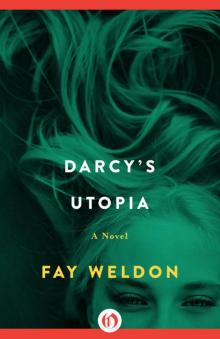 Darcy's Utopia
Darcy's Utopia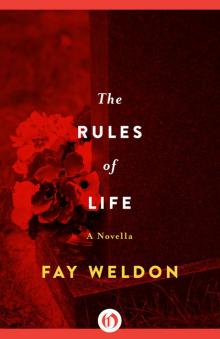 The Rules of Life
The Rules of Life Kehua!
Kehua! Before the War
Before the War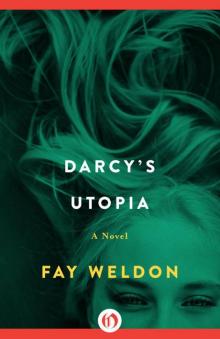 Darcy's Utopia: A Novel
Darcy's Utopia: A Novel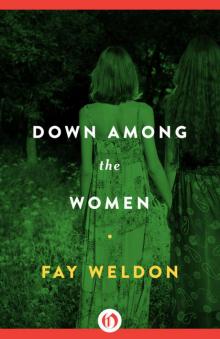 Down Among the Women
Down Among the Women Letters to Alice
Letters to Alice 3 Great Historical Novels
3 Great Historical Novels Female Friends
Female Friends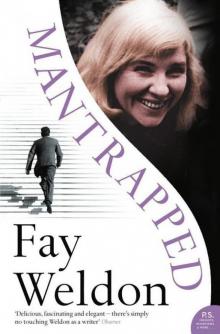 Mantrapped
Mantrapped The Bulgari Connection
The Bulgari Connection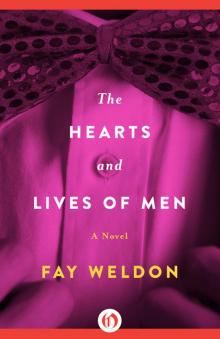 The Hearts and Lives of Men
The Hearts and Lives of Men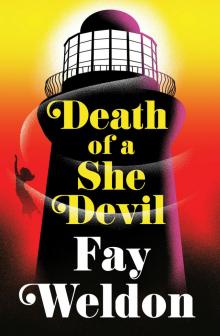 Death of a She Devil
Death of a She Devil